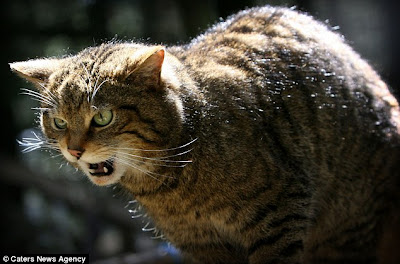 Furry tale: It is one of two wildcat kittens - named Brave and Merida from the Disney film - who are a big hit at Highland Wildlife Park, near Aviemore, Invernessshire
Furry tale: It is one of two wildcat kittens - named Brave and Merida from the Disney film - who are a big hit at Highland Wildlife Park, near Aviemore, InvernessshireThey stare into the camera with wide-eyed innocence.
But it will not be long before these cute kittens grow into powerful predators.
Two young wildcats, named Brave and Merida after the Disney characters, were born at the animal park at Kincraig run by the Royal Zoological Society of Scotland.
Their arrival came as it emerged that as few as 400 of Scotland's wildcats survive in the wild, as the species is under threat from inter-breeding.
 However, a new DNA test is offering hope that the species might survive. The test, which could be ready by Christmas, could identify which cats are pure-bred, and which are hybrid and pave the way for a breeding programme which could save the species.
However, a new DNA test is offering hope that the species might survive. The test, which could be ready by Christmas, could identify which cats are pure-bred, and which are hybrid and pave the way for a breeding programme which could save the species. It would allow for the testing of cats both in captivity and in the wild and for measures to be taken to protect those pure-bred wildcats that remained from being hybridised into extinction.
 Wild at heart: A genetic test is currently under development which, if successful, will show definitively whether individual cats are pure-bred wildcats or hybrids
Wild at heart: A genetic test is currently under development which, if successful, will show definitively whether individual cats are pure-bred wildcats or hybrids Last of its kind? With just 400 thought to remain in the wild and those under threat from inter-breeding these could be some of last pictures of Scotlands wildcats
Last of its kind? With just 400 thought to remain in the wild and those under threat from inter-breeding these could be some of last pictures of Scotlands wildcatsThe current official estimate of 400 Scottish wildcats remaining in the wild is an informed guess; the worst-case scenario ‘that there is none’ is a genuine possibility.
Douglas Richardson, animal collections manager at the Highland Wildlife Park, said: ‘We get our knickers in a twist because the Indians aren’t doing all they can to protect their tigers, or the Kenyans their black rhinos, but it’s OK for us to let this one slip through the net? I don’t think so.
 The animals are one of the big attractions at the park in Kincraig, which is run by the Royal Zoological Society of Scotland
The animals are one of the big attractions at the park in Kincraig, which is run by the Royal Zoological Society of Scotland ‘Here we have this iconic emblem of the Highlands and if we don’t get our finger out, it will become extinct, guaranteed.’
Wildcats are the only remaining large mammal predator and the only surviving cat native to Britain.
Persecution and deforestation contributed to a drop in numbers during the 18th and 19th centuries, but although suitable habitat has increased again, their numbers have continued to dwindle, due partly to disease and road accidents, but mainly to interbreeding with domestic cats.
Douglas said: ‘If you let dogs run feral, people would be up in arms for a very good reason. Cats? They think it’s all right.
‘We don’t want to stop anyone having cats, but we want to shut off the taps of more animals going to live a feral existence and cross-breeding with wildcats.’
 At risk: The test, which could be ready by Christmas, would pave the way for further, much-needed wildcat conservation work
At risk: The test, which could be ready by Christmas, would pave the way for further, much-needed wildcat conservation work One of the two new kittens born at the wildlife park
One of the two new kittens born at the wildlife park The kittens stalk around their mother as they enjoy the sunshine at the Highland Wildlife Park
The kittens stalk around their mother as they enjoy the sunshine at the Highland Wildlife Parksource: dailymail













